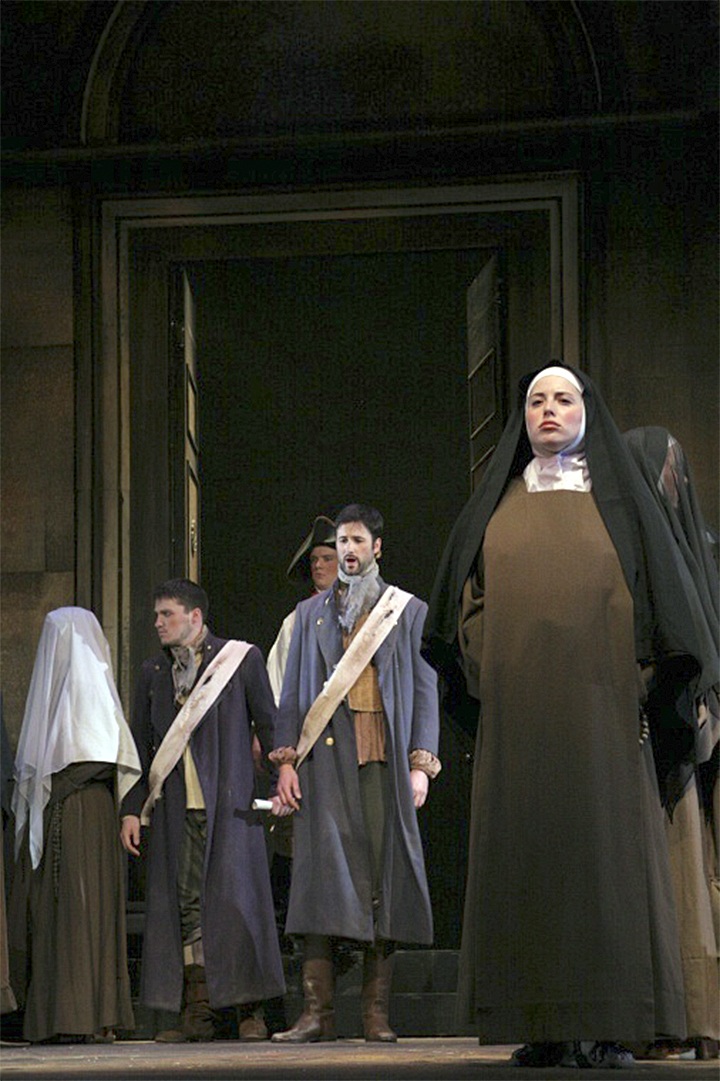Toward the end of the Reign of Terror during the French Revolution, 16 Carmelite nuns gathered at the base of a guillotine and kissed a small statue of the Virgin Mary hidden in the hands of the order’s prioress, before climbing the scaffolding to their death. Ten days later, the Reign of Terror ended.
Called an act of consecration rather than martyrdom, the nuns’ decision arose out of solidarity — refusing to renounce their beliefs, the nun’s chose, instead, confirmation of their faith, community and country.
The dramatic facts became the fictionalized narrative of Francis Poulenc’s 1957 opera, “Dialogues of the Carmelites.” Vashon Opera will open its eighth season with the production of “Dialogues” at 7:30 p.m. Friday, Sept. 16, and 2:30 p.m. Sunday, Sept. 18, at the Katherine L White Hall.
Considered unique among traditional operas for the lack of standard plot devices of romance and betrayal, murder and intrigue, “Dialogues of the Carmelites” is a series of 12 tableaux during which the young nuns grapple with life or death issues with powerful consequences.
Poulenc ties the 12 dialogues together with orchestral interludes that Vashon Opera’s Artistic Director Jennifer Krikawa calls a haunting, modern musical score.
“There are no repeating arias, no A-B-A structure,” she said. “There are beautiful chords and tunes — based on plainchant — like a movie score as the music describes the emotions. We sing it in French, with English subtitles. Poulenc wrote it so that each word is on a note.”
Challenged with creating 12 different settings and not wanting to follow in the minimalist footsteps of other productions, Krikawa uses the musical interludes to change the four 17-foot moveable walls that define each new scene. She envisioned each wall painted a different color or as a faux brick or stone facade, with the sheer size of the walls playing a symbolic role.
“They are so big that the people standing in front of them look small, like the enormity of the decisions in front of the nuns,” she said. “We wanted to focus on the conversations the people are having without distraction.”
The main character, a young noblewoman who enters the Carmelite monastery seeking protection from the anti-aristocratic violence, discovers that within her sanctuary, she is asked to defend the monastery and ultimately choose to stand with her new-found community or run away.
With 16 singing roles for women, the cast features popular veterans of previous Vashon Opera productions. Returning singers include Janeanne Houston, Julia Benzinger, Wesley Morgan, Jessica Milanese, Beth Madsen Bradford, Michael Dunlap, Dierre Lopez, Nerys Jones, Samatha Gorham, Brendan Tuohy, John Marzano and Rick Turner. Allison Pohl, Michael Delos, Hugh Davis and Ben Kramer will make their Vashon Opera debuts.
The opera’s chorus, led by Joe Farmer, will sing as the nuns and members of the revolutionary crowd, with musical director and conductor, orchestral arranger and stage manager Jim Brown overseeing the entire production.
The opera’s dedicated team of volunteers once again have worked diligently for months on many fronts. Their efforts help to keep costs low, but sponsors are needed for each production. Longtime islander and singer Jo Ann Bardeen stepped up to sponsor “Dialogues,” dedicating her gift in memory of her parents, John and Alice Arthur. The singers also helped defray costs on the production, taking lower fees out of a desire to perform the piece.
“Singers want to do this opera, and a lot don’t get to do it,” Krikawa said. “It’s a really artistic thing. They love the music, and it is about something, not just romantic love.”
The opera is also not just about defending the Catholic faith, she added.
“It’s about a community of people who stood up for themselves and said you cannot break us,” she said. “I like the community aspect. All of the women die for the cause because they are part of something. All humans feel that need.”


